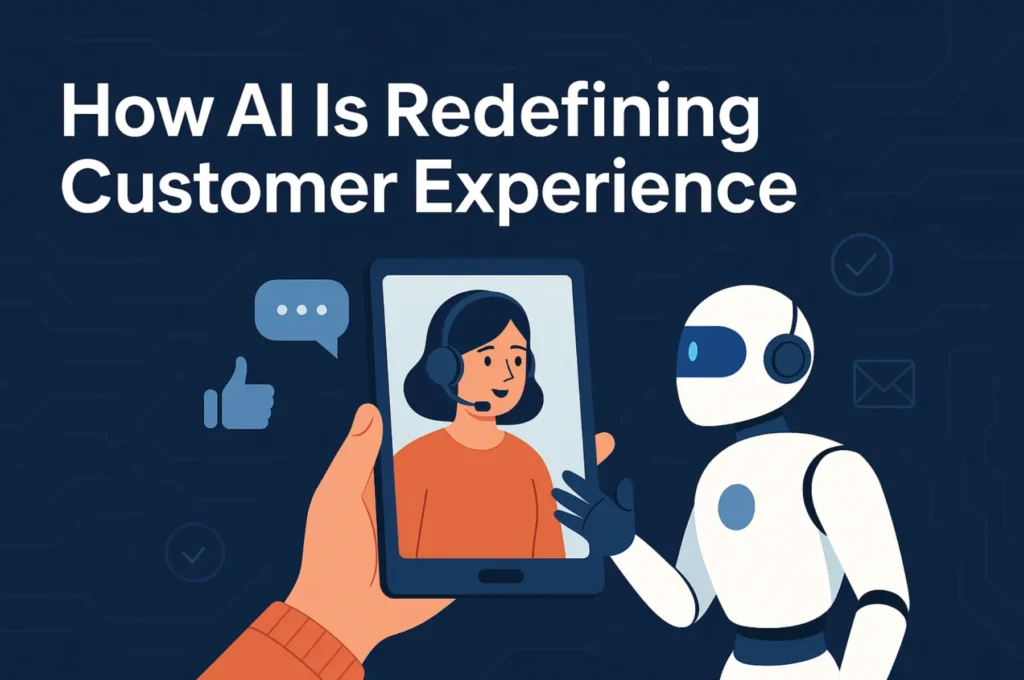How AI Is Redefining Customer Experience


AI In Customer Experience
Table of Contents
Serious about growing your business? Let’s plan exactly how to get you more leads, sales, and results—faster.
(A Complete Guide to AI in Customer Support and Customer Relationship Management)

Key Takeaways
- AI technologies like chatbots, conversational AI, and predictive analytics are enabling faster, smarter, and more personalised customer experiences at scale.
- 51% of consumers prefer engaging with AI chatbots for instant service across platforms like OpenAI Chat, Google AI Chatbot, and ChatGPT-4.
- AI reduces service costs by up to 30% and boosts customer satisfaction by up to 20%, helping companies streamline support while improving outcomes (McKinsey).
- AI anticipates customer needs before issues arise, enabling businesses to prevent churn and personalise the customer journey dynamically.
- AI in customer relationship management is optimising predictive outreach, hyper-personalisation, and automated retention strategies.
- By 2025, AI will manage up to 95% of all customer interactions, including voice, chat, and messaging, making conversational AI and predictive personalisation standard practices.
The AI-CX Revolution
If you’re a business owner today, you’re already feeling the shift: Artificial Intelligence (AI) is no longer a future trend — it’s reshaping customer experience (CX) right now.
According to the Zendesk Customer Experience Trends Report 2024, 65% of CX leaders say AI is now a strategic necessity, not a nice-to-have — leaving traditional customer service methods behind.
Leading businesses are already using AI chatbots, conversational AI, and predictive analytics to do more than just automate responses — they’re building deeper, more personalised customer relationships at scale.
And the momentum is only growing.
Google reports a 7x surge in AI projects, while Microsoft showcases widespread AI adoption across industries—clear signs that the businesses winning today (and tomorrow) are the ones embracing AI-driven customer experience.
In this guide, I’ll show you exactly how AI is transforming customer support, customer care, and relationship management — and how you can stay ahead of the curve.
Digital Marketing, SEO & PPC
- SEO to boost rankings and capture high-intent, AI-driven traffic
- Performance Marketing to run ROI-focused campaigns that convert
- Content Marketing to drive clicks, earn links, and build authority

Understanding AI in Customer Experience
Artificial Intelligence (AI) is the ability of machines to perform tasks that typically require human intelligence.
This includes understanding language, learning from data, recognising patterns, making decisions, and even holding conversations.
Today, AI powers many everyday tools — from recommendation systems on shopping websites to virtual assistants like Siri or Alexa.
When it comes to customer experience (CX), AI is playing an even bigger role.
AI in customer experience means using intelligent technologies to improve how businesses interact with their customers, making those interactions faster, more personalised, and more efficient.
Instead of relying solely on human teams, companies now use AI tools like chatbots, predictive analytics, and conversational AI to:
- Answer customer queries instantly
- Understand and predict customer needs
- Personalise offers and communication
- Solve problems before they happen
- Improve service quality while reducing costs
In short, AI helps businesses deliver the kind of experience today’s customers expect — quick, personal, and seamless — at a scale that would be impossible with human teams alone.
And a study by the U.S. Chamber of Commerce and Teneo revealed that nearly all small businesses (98%) are utilising AI-enabled tools, with 40% specifically adopting generative AI technologies like chatbots and image creation.
Marketing Research & Strategy
We help you understand your market and build smart strategies to attract more customers and grow faster.
- Detailed research into your competitors, customers, and market
- Custom marketing and growth plans that drive real results
- Clear action steps to increase traffic, leads, and sales

ADWORDS ROI
Cut Ad spend

Key Benefits of AI in Customer Experience
AI isn’t just changing customer service — it’s improving it in ways that were hard to imagine just a few years ago.
Here’s how AI is helping businesses deliver faster, smarter, and more meaningful experiences:
1. 24/7 AI Customer Support
Today’s customers don’t want to wait — and with AI, they don’t have to.
AI chatbots and virtual agents allow businesses to offer instant, around-the-clock support without stretching their human teams.
In fact, according to Zendesk, 51% of consumers now prefer interacting with AI bots for faster service.
With technologies like OpenAI Chat and Google AI Chatbot, businesses can provide real-time answers, resolve simple issues immediately, and keep customers satisfied — even outside business hours.
For businesses, this means happier customers, fewer support backlogs, and lower staffing costs.
2. Hyper-Personalised Experiences
Personalisation isn’t just a bonus anymore — customers expect it.
AI chatbots and conversational AI platforms use real-time behavioural data to deliver personalised recommendations, special offers, and support tailored to each individual.
For example, Grove Collaborative uses AI to create truly personalised customer conversations — making every interaction feel unique and relevant.
This approach strengthens customer loyalty, increases average order values, and helps brands stand out in a crowded market.
3. Predictive Customer Insights
AI doesn’t just react — it predicts.
Using historical and real-time data, predictive AI models can foresee customer actions, preferences, and potential problems before they happen.
Businesses like Motel Rocks are using AI-powered sentiment analysis to:
- Prioritise customer issues
- Spot potential churn risks
- Personalise service for better outcomes
Instead of relying on reports or guesswork, companies can now instantly ask AI tools:
“Why are customers abandoning checkout?” — and get data-backed answers that drive smarter decisions.
This predictive ability helps businesses act faster, fix problems earlier, and serve customers better.
4. Operational Efficiency and Cost Savings
AI is not just improving service quality — it’s also making operations leaner and more efficient.
By automating repetitive tasks like ticket triaging, basic inquiries, and data collection, AI lets human teams focus on more complex, high-value work.
For example, Zendesk AI helped businesses save around 220 hours every month by automating manual triage processes.
And according to McKinsey, companies that adopt AI in customer service can reduce service costs by up to 30% — without compromising on quality.
This means lower overheads, faster responses, and a stronger bottom line.
5. Improved Quality Assurance and Training
Consistently delivering great service isn’t easy — but AI makes it easier.
AI-powered tools can:
- Monitor customer interactions in real-time
- Score agent performance based on quality and empathy
- Provide instant feedback and training suggestions
For example, Liberty London uses AI within its customer relationship management (CRM) system to assess service quality and continuously improve agent training.
By identifying trends early and coaching teams proactively, businesses can deliver a better experience at every touchpoint — without waiting for problems to show up.
Also Read: Impact of Artificial Intelligence in Marketing: 2025 and Beyond
Real-World Applications and Success Stories
While the potential of AI sounds exciting, what matters most is how businesses are putting it into action — and seeing real results.
Here are a few examples of how some of the world’s most recognised brands are using AI to transform customer experience:
1. Amazon: Personalisation at Massive Scale
Amazon was one of the first companies to show the real power of AI in customer experience.
Its recommendation engine — powered by machine learning — suggests products based on browsing history, past purchases, and even what similar customers have viewed.
This AI-driven personalisation generates about 35% of Amazon’s total revenue.
It’s a clear example of how understanding customers better (and earlier) leads directly to stronger sales and loyalty.
2. Starbucks: Predictive Personalisation Through the Starbucks App
Starbucks uses AI in its loyalty app to personalise customer experiences.
Their “Deep Brew” AI platform analyses customer preferences, purchasing patterns, and even the weather to send hyper-targeted offers and product suggestions.
For example, if it’s a hot afternoon, the app might suggest a cold coffee promotion tailored just for you.
This proactive, personalised engagement has helped Starbucks significantly increase mobile order usage and customer retention.
3. Netflix: Using AI to Predict What You’ll Love Watching
Netflix’s entire customer experience — from recommendations to previews — is powered by AI.
The platform analyses millions of user behaviors every day, from what people watch to when they pause or stop a show.
Their AI not only recommends what you should watch next but also customises the artwork you see based on what you’re most likely to click.
This level of micro-personalisation has been a major factor behind Netflix’s high customer satisfaction and low churn rates.
4. Sephora: AI-Driven Beauty Advice
Beauty giant Sephora uses AI to offer customers more personalised shopping experiences both online and in-store.
Through their “Virtual Artist” tool, customers can upload a selfie and virtually try on different makeup products using augmented reality powered by AI.
Sephora also uses chatbots to assist customers with product recommendations based on skin type, preferences, and previous purchases.
By combining AI with a human touch, Sephora has set a new standard for personalisation in retail.
5. Hilton Hotels: AI Chatbots for Seamless Customer Service
Hilton’s AI-powered chatbot, “Connie,” helps guests find hotel information, local attractions, and dining recommendations — all through natural conversation.
It’s designed to reduce wait times, answer common questions instantly, and create a smoother travel experience.
By introducing conversational AI into its operations, Hilton not only improved customer satisfaction but also reduced the workload on front-desk staff.
Beauty giant Sephora uses AI to offer customers more personalised shopping experiences both online and in-store.
Through their “Virtual Artist” tool, customers can upload a selfie and virtually try on different makeup products using augmented reality powered by AI.
Sephora also uses chatbots to assist customers with product recommendations based on skin type, preferences, and previous purchases.
By combining AI with a human touch, Sephora has set a new standard for personalisation in retail.
Challenges and Ethical Considerations in AI
While AI has huge potential to improve customer experience, implementing it isn’t always straightforward.
Many businesses face challenges — both technical and ethical — when trying to adopt AI at scale.
Let’s break them down:
The AI Adoption Gap
Even though AI is growing fast, most businesses are still in the early stages of using it properly.
According to the FullStory Reality Check 2025, only 13% of businesses have extensively adopted AI for customer experience.
In other words — a lot of companies talk about AI, but far fewer are actually using it in a way that makes a real difference.
Common Challenges Businesses Face
- Lack of AI Literacy: Many teams don’t fully understand how AI works, what it can (and can’t) do, or how to manage it effectively. Without the right knowledge, it’s hard to unlock AI’s full value.
- Poor Data Quality: AI is only as good as the data you feed it. Incomplete, outdated, or biased data can lead to poor predictions, bad recommendations, and customer frustration.
- Integration with Legacy Systems: Many businesses still run on older tech stacks. Trying to plug modern AI tools into outdated systems can cause compatibility issues and slow adoption.
- Human Resistance to Change: People often resist new technology — especially when they fear it could replace their jobs. For AI adoption to succeed, companies must focus on clear communication, training, and showing how AI supports, not replaces, human teams.
Ethical and Privacy Considerations
Building customer trust is critical — and careless use of AI can quickly break it.
Here are the ethical areas businesses must focus on:
- Data Privacy and Protection: Customers are increasingly aware of how their data is used. Businesses must be transparent, secure, and responsible with customer information at every step.
- Transparency in AI Decisions: When AI makes decisions that affect customers (like offering a discount or prioritising service), businesses should be ready to explain why and how.
- Avoiding Bias in AI Models: If AI systems are trained on biased data, they can unintentionally discriminate against certain groups. Regular ethical audits are essential to ensure fairness and inclusion.
Future Outlook: AI's Expanding Role in CX
The next phase of AI in customer experience will be about deeper connection, smarter prediction, and greater trust. Here’s what’s ahead:
- AI Will Handle 95% of Customer Interactions: By 2025, AI will manage the majority of service conversations across chat, voice, and messaging channels.
- Conversational AI Will Feel More Human: Advances like ChatGPT-4 and OpenAI chat models will make AI more emotionally intelligent, adapting responses based on customer tone and sentiment.
- Hyper-Personalisation Will Be the Norm: AI will orchestrate complete, real-time customer journeys — not just suggest products, but personalise every interaction based on immediate needs.
- Proactive Service Will Replace Reactive Support: Businesses will predict and solve customer problems before they arise, creating seamless, hassle-free experiences.
- Ethical AI Will Build Customer Trust: Transparency, privacy, and fairness will move from "nice-to-have" to essential business practices, helping brands earn lasting loyalty.
Conclusion: Human-Centric AI in Customer Experience
The future of customer experience isn’t about replacing humans with machines — it’s about using AI to create smarter, faster, and more human connections at scale.
Businesses that embrace AI today are already seeing the benefits:
- 24/7 support without adding extra teams,
- personalised experiences that drive loyalty,
- and predictive insights that solve problems before they arise.
But AI alone isn’t the answer.
The real winners will be the companies that combine technology with empathy — using AI to handle routine tasks efficiently, while empowering human teams to focus on creativity, problem-solving, and genuine relationship building.
If you want your business to grow, stay relevant, and deliver the experiences customers now expect, embracing AI in customer experience isn’t optional — it’s essential.
The good news?
You don’t have to be Amazon, Netflix, or Starbucks to do it.
Even small steps — smarter chatbots, better data insights, more proactive service — can set you apart and lay the foundation for a stronger, more customer-centric future.
The future of customer experience is already here.
The question is — are you ready to lead it?
FAQs
How is AI used in customer experience?
AI is used to automate support, personalise interactions, predict customer needs, and improve service quality across chat, voice, and digital platforms.
What are the benefits of using AI in customer service?
AI offers 24/7 support, reduces costs, personalises experiences, predicts issues early, and boosts overall customer satisfaction and loyalty.
Will AI replace human customer service agents?
No, AI is designed to support human agents by handling routine tasks, freeing up humans to focus on complex, empathetic, and relationship-driven conversations.
What are the challenges of implementing AI in CX?
Common challenges include data quality issues, integration with legacy systems, lack of AI literacy, customer trust concerns, and ensuring ethical AI use.




